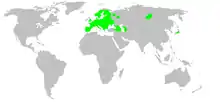| Diaea dorsata | |
|---|---|
.jpg.webp) | |
| Scientific classification | |
| Domain: | Eukaryota |
| Kingdom: | Animalia |
| Phylum: | Arthropoda |
| Subphylum: | Chelicerata |
| Class: | Arachnida |
| Order: | Araneae |
| Infraorder: | Araneomorphae |
| Family: | Thomisidae |
| Genus: | Diaea |
| Species: | D. dorsata |
| Binomial name | |
| Diaea dorsata (Fabricius, 1777) | |
 | |
Diaea dorsata is one of the smaller crab spiders, with a palearctic distribution.[1] Females can grow up to 6 mm, males up to 4 mm. Prosoma and legs are green, the opisthosoma is yellowish with a brown mark.
Diaea dorsata prefers forest edges. It can be found on oak leaves. The subadults overwinter under the bark of dead trees. Adults appear in May. The males have an extended non-damaging combat ritual: They stand opposed, stretch their front legs and dance around each other. This can go on for hours. This is highly unusual for crab spiders, but for example often found in jumping spiders.
An agranular green pigment is incorporated into the mesocuticle of this species and thus lost between moults.[2]
References
Wikimedia Commons has media related to Diaea dorsata.
Wikispecies has information related to Diaea dorsata.
- ↑ "Diaea dorsata". World Spider Catalog. Retrieved 31 July 2017.
- ↑ Oxford, G.S. & Gillespie, R.G. (1998). Evolution and Ecology of Spider Coloration. Annual Review of Entomology 43:619-643. doi:10.1146/annurev.ento.43.1.619 PMID 15012400
This article is issued from Wikipedia. The text is licensed under Creative Commons - Attribution - Sharealike. Additional terms may apply for the media files.